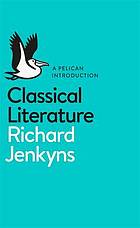
Classical Literature
An Epic Journey from Homer to Virgil and Beyond
کتاب های مرتبط
- اطلاعات
- نقد و بررسی
- دیدگاه کاربران
نقد و بررسی

December 15, 2015
A deft distillation of 1,000 years of literature. Classicist Jenkyns (Emeritus, Classical Tradition/Univ. of Oxford; God, Space, and the City in the Roman Imagination, 2014, etc.) crafts a concise and spirited overview of poetry, drama, and prose from Homer to post-Augustan Rome, focusing on a broad swath of writers. "The ancient Greeks and Romans are our parents," he asserts, "and on the whole they have been good parents," inspiring future writers--Shakespeare, Milton, and, notably, the Romantics--to build on their rich foundation. That foundation is startlingly incomplete, represented by works that were repeatedly copied. All manuscripts from classical authors, notes the author, "are copies of copies of copies." We know the love poems of Sappho, Catullus, and Lucretius on the basis of a few manuscripts, while Cicero was survived by all or part of his 58 speeches and more than 900 letters), making him one of the best known personages of antiquity. Many, once admired, are now completely lost. Among the vast strides made by Greek writers, Jenkyns praises those of the sixth and fifth centuries B.C.E. for discovering differences: "fact was different from fiction, history from myth, natural science from philosophy" and verse from prose. He praises Aeschylus, Sophocles, and Euripides, whose masterful tragedies emerged from Athens "within a period of less than a century." But all writers do not merit his acclaim. Ovid's Metamorphoses, he writes, "can be overrated....His passages of natural description are rather unimaginative." Virgil seems to the author a greater poet. In later fifth-century Greece, Jenkyns notes the disjunction between repetitive forms of visual art (sculpture and architecture) and "daring and innovative, sometimes wild or experimental" literary forms. In the fourth century, with the advent of Plato, "a literary artist of a high order," and Aristotle, philosophy "got off to a dazzling start." Jenkyns' enthusiasm and erudition infuse a shrewd, illuminating narrative.
COPYRIGHT(2015) Kirkus Reviews, ALL RIGHTS RESERVED.

Starred review from January 1, 2016
A noted classicist (professor emeritus of the classical tradition, Univ. of Oxford), Jenkyns's diverse interests have resulted in books on Jane Austen and Westminster Abbey in addition to important works on Virgil, Sappho, and the Victorian reception of Greek and Latin culture. This new book is a concise, accessible historical overview of Greek and Latin literature, beginning with Homer and ending with the Roman novels Satyrica and the Golden Ass. Rather than burying the reader in scholarly technicalities, Jenkyns presents his exploration in terms of vigorous and insightful interpretations of the canonical works. In this, the author often takes a polemical stance, challenging conventional popular readings, such as the nature of tragedy in Antigone or gender in Sappho. Jenkyns's analysis ranges over epic, lyric, oratory, philosophical dialog, drama, and the novel. He also treats the great historians Herodotus, Thucydides, and Tacitus from a literary perspective. VERDICT A rich, witty, perceptive, and brief account of the Greek and Latin classics and their importance, both in themselves and in their enduring influence on the Western world. One of the best introductions available to the general reader.--Thomas L. Cooksey, formerly with Armstrong Atlantic State Univ., Savannah
Copyright 2016 Library Journal, LLC Used with permission.

























دیدگاه کاربران